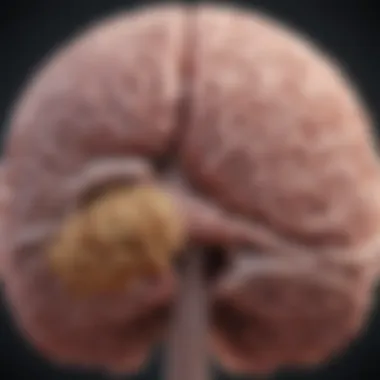Chronic Stress and Gut Health: Understanding the Connection


Background and Context
Chronic stress impacts many aspects of our lives, yet its connection to gut health often goes unnoticed. We live in a fast-paced world where stress seems to be part and parcel of daily existence. The rising prevalence of anxiety and depression underscores the need to understand how this stress seeps into our bodies, particularly affecting our gastrointestinal system.
Historically, the relationship between mind and body has been a subject of scrutiny for centuries. Ancient practices like yoga and meditation recognized that emotional well-being profoundly influences physical health. Modern science has increasingly supported these notions. Research has mapped out the gut-brain axis, a communication network linking the gut and the brain, showing how stress can alter gut microbiota and consequently influence health outcomes.
By delving into this intricate interplay, we not only cultivate a deeper insight into gut health but also pave the way for interventions that stand hands-on in mitigating the effects of stress.
Key Findings and Discussion
Major results of the study
Several studies highlight alarming trends regarding chronic stress and its toll on gut microbiota. Recent research points out that prolonged stress responses can lead to dysbiosis—a condition where the balance of microbes in the gut is disrupted. When this occurs, a variety of gastrointestinal disorders may emerge, including irritable bowel syndrome (IBS) and inflammatory bowel disease (IBD).
Moreover, stress hormones, such as cortisol, can exacerbate inflammation, thus creating a vicious cycle. Elevated levels of cortisol might further impair digestive function, breeding a fertile ground for gastrointestinal imbalances.
Detailed analysis of findings
Despite the grim findings, there is a silver lining. Understanding these mechanisms lays the groundwork for innovative treatment strategies. To tackle the stress-gut link, researchers are looking into several potential interventions:
- Dietary Adjustments: A balanced diet rich in probiotics can help restore gut flora. Incorporating foods like yogurt, sauerkraut, and kefir might be beneficial.
- Mindfulness and Stress Reduction: Techniques such as meditation and deep-breathing exercises can significantly reduce stress, thereby indirectly fostering a healthier gut.
- Physical Activity: Regular exercise releases endorphins, which not only alleviate stress but also contribute positively to gut health.
"Understanding the intricate connection between chronic stress and gut health is crucial for developing comprehensive wellness strategies."
Such interventions not only aim to restore gut health but also help in managing stress levels more effectively. By synthesizing current knowledge and practices surrounding gut health, we can better equip ourselves for a healthier future amidst the challenges posed by chronic stress.
Understanding Chronic Stress
Chronic stress is a term that seems to float around in more conversations now than ever. But what exactly is it, and why is it crucial to understand this concept? The aim here is to peel back the layers on chronic stress and its multifaceted implications for gut health, among other aspects. By diving into this area, we can better grasp how persistent stressors—not just the occasional pressures of daily life, but those that linger—affect our physiological and psychological well-being, particularly in relation to gut health.
Defining Chronic Stress
Chronic stress refers to the prolonged experience of stress, which can be triggered by various factors such as financial strain, work-related pressures, or personal conflicts. Unlike acute stress, which can sometimes motivate individuals to act and resolve immediate issues, chronic stress hangs around like an unwelcome guest, often contributing to numerous health problems.
When stress becomes a long-term companion, it can lead to a cascade of adverse effects on the body, particularly on the immune and digestive systems. Thus, understanding this phenomenon isn’t just a matter of academic curiosity; it holds real-world importance for our day-to-day functioning and overall health.
Physiological Response to Stress
Stress doesn’t just sit there and twiddle its thumbs. It sets off a series of events in the body, particularly activating the hypothalamic-pituitary-adrenal (HPA) axis.
Activation of the Hypothalamic-Pituitary-Adrenal Axis
The HPA axis serves as a central stress response system. It links the hypothalamus and the pituitary gland with the adrenal glands above the kidneys. When faced with stress, the hypothalamus releases corticotropin-releasing hormone (CRH), signaling the pituitary to secrete adrenocorticotropic hormone (ACTH). As a result, the adrenal glands produce cortisol. This process is significant because it illustrates how our bodies respond to stressors on a hormonal level.
The key characteristic of the HPA axis activation is its speed and efficiency in battling immediate threats. In this article's context, understanding this mechanism is crucial. When the system functions normally, it can help the body adapt and respond; when it fails to regulate properly, it can contribute to health problems, particularly in the gut.
Role of Cortisol
Cortisol, often labeled the stress hormone, plays a fundamental role in how our body reacts to stress. It’s not inherently bad—cortisol helps to manage how your body uses carbohydrates, fats, and proteins. A healthy balance is important for things like blood sugar regulation and cardiovascular function. However, the implications when cortisol remains elevated over a long period are concerning.
The unique feature of cortisol's role here is its dual nature. On one hand, adequate levels boost alertness and performance. On the flipped coin, too much cortisol leads to breakdowns in bodily functions, including those involved in gut health. Chronic high cortisol levels can lead to inflammation and changes in gut microbiota, further feeding the cycle of stress-gut problems.
Long-term Consequences of Stress
The shadow of chronic stress doesn’t just impact the moment; its long-term consequences echo throughout various aspects of health, most notably mental well-being.
Impact on Mental Health
Prolonged exposure to stress significantly raises the risk of mental health issues. Anxiety disorders, depression, and mood swings are often linked to sustained psychological pressure. The importance of recognizing how stress culminates into these mental health challenges cannot be overstated.
One of the benefits of addressing chronic stress in this article is promoting awareness. If someone can see the connection between their stress levels and their mood, they can start to take steps toward managing it. A unique feature of understanding this link is the potential for lifestyle adjustments that can alleviate symptoms and foster resilience.


Association with Chronic Diseases
Chronic stress has been tied to a host of chronic diseases including heart disease, diabetes, and even autoimmune disorders. The key characteristic of this association is that stress serves not just as a precursor but can exacerbate existing conditions, leading to worse health outcomes. Recognizing this interplay is unexpectedly beneficial for creating strategies to address chronic stress.
This topic distinguishes itself in that the polarities are clear: chronic stress cultivates an environment where diseases can thrive. Understanding this relationship equips people with the knowledge to navigate and potentially mitigate risks.
By understanding the nuances of chronic stress, we can better appreciate its potential threats and prepare to ward off its effects, particularly on gut health. The following sections will delve into how these stressors imply broader health issues.
The Human Gut Microbiome
The gut microbiome has gained significant attention in both scientific research and public discourse. Understanding this intricate ecosystem is essential for grasping how chronic stress can disrupt overall health. At its core, the gut microbiome refers to the diverse community of microorganisms residing in our digestive tract, which includes bacteria, fungi, viruses, and other microbes. This community is not just a passive observer; it's a vibrant hub of activity that plays a critical role in numerous bodily functions. Moreover, an imbalance in this microbiome—known as dysbiosis—can manifest notably during periods of chronic stress.
It's pivotal to comprehend the composition and functions of gut microbiota, as these insights help unravel the links between stress, health, and disease. Therefore, investigating the gut microbiome is not merely an academic exercise; it's a necessary approach to safeguarding one's health, particularly for individuals grappling with chronic stress.
Composition of Gut Microbiota
The composition of gut microbiota is a fascinating tapestry that varies from person to person. This diversity is shaped by numerous factors such as diet, genetics, age, and environment. In healthy individuals, a balanced gut microbiome typically features hundreds of different species, predominantly bacteria, forming a complex web of interactions. Firmicutes and Bacteroidetes are two of the most prevalent phyla, and they play vital roles in digestion and metabolism.
However, stress can influence this composition dramatically. When individuals experience chronic stress, certain microbial populations might flourish while others dwindle. This shift can lead to dysbiosis, characterized by an imbalance that adversely affects gut function. Such alterations in the gut microbiome can have ripple effects throughout the body, influencing everything from mood and immune response to metabolic processes.
Functions of the Gut Microbiome
The gut microbiome isn't just there to fill space; it serves several essential functions that contribute to overall well-being. The primary areas of focus include nutrient absorption and immune system support.
Nutrient Absorption
Nutrient absorption is among the gut microbiome's critical functions. The microbiota aids in breaking down complex carbohydrates and fibers that our own digestive enzymes cannot handle alone. This process contributes to the production of short-chain fatty acids, which are vital for energy and maintaining gut health. A well-functioning microbiome can enhance nutrient bioavailability, allowing the body to absorb more vitamins and minerals from food.
- Key Characteristic: The importance of beneficial bacteria in creating a conducive environment for nutrient absorption.
- Unique Feature: The interplay between gut bacteria and the digestive system, a sort of symbiotic relationship where both parties benefit.
- Advantages: Better nutrient absorption boosts health, especially in individuals dealing with chronic stress, who might have impaired digestion.
Nevertheless, it’s essential to recognize that the efficiency of nutrient absorption can be compromised during periods of stress. This is partly due to how stress impacts gut motility and secretions, leading to reduced digestion and nutrient uptake.
Immune System Support
The second significant function of the gut microbiome relates to immune system support. A healthy microbiota acts as a first line of defense against pathogens by competing for resources and producing antimicrobial substances. Furthermore, gut microbiota play a crucial role in educating the immune system. This training helps the body discern between harmful invaders and harmless substances, reducing the chances of autoimmune disorders.
- Key Characteristic: The role of gut bacteria in shaping and regulating the immune response, creating a physical barrier against pathogens.
- Unique Feature: Commensal bacteria can modulate inflammatory responses, which is invaluable in maintaining health, especially when under the stress of chronic illness.
- Advantages: A robust immune response can mitigate the symptoms of stress-related conditions, and a healthy gut can aid in quicker recovery from illnesses.
On the flip side, chronic stress can hinder the immune system's proper functioning, allowing for a breeding ground for infections and diseases. This is another example of how interconnected the gut microbiome is with both physical and mental health.
"A balance in the gut is crucial. It’s not only about what we eat but also about how we feel. Stress can tip the balance, leading to serious consequences."
In summary, the human gut microbiome stands as a cornerstone for understanding our overall health, especially as it interrelates with chronic stress. By delving into its composition and functions, we lay the groundwork for grasping how stress can affect our bodies on multiple levels. This understanding sets the stage for exploring the broader implications of gut health in our increasingly stressful worlds.
Impact of Chronic Stress on Gut Health
Chronic stress has become an unavoidable part of contemporary life, suffocating health at both psychological and physiological levels. The human gut, often dubbed the second brain, plays a pivotal role when it comes to stress responses, showcasing a labyrinth of interconnections that underscore the importance of this topic. Prolonged stress disrupts not just mental peace but can also initiate a cascade of reactions within the gut that could lead to severe health issues.
The relationship that stress has with gut health extends to microbial balance, emotional wellbeing, and the overall functionality of the intestinal system. These intersections are noteworthy, particularly because the consequences can range from mild discomfort to debilitating diseases. Understanding these connections can equip individuals with knowledge to lead healthier lives and potentially curb the ever-increasing stress levels that plague society today.
Dysbiosis and Its Implications
Altered Microbial Composition
Dysbiosis refers to an imbalance in the gut microbiota, often fueled by chronic stress. This altered microbial composition can lead to decreased diversity among gut bacteria, a critical factor for a healthy gut ecosystem. One of the key characteristics of altered microbial environments is the overgrowth of pathogenic bacteria in relation to beneficial ones. This situation can cause significant digestive disturbances and even systemic inflammation.
In this article, the importance of addressing altered microbial composition lies in its correlation to many aspects of health, including mood and immune function. When looking deeper, unique features of this dysbiosis hint at advantages like developing targeted dietary approaches to restore balance. However, the disadvantages can overshadow them, especially when considering how dysbiosis can be a precursor to various health complications.
Effects on Gut Barrier Function
The integrity of the gut barrier is another critical aspect that suffers due to chronic stress. One of the specific aspects to consider is how stress-induced inflammation can lead to increased intestinal permeability, commonly referred to as 'leaky gut.' This condition allows toxins and undigested food particles to pass through the gut lining into the bloodstream, triggering immune responses that can result in further health problems.


This discussion is key to understanding the implications stress has on gut barrier function. A healthy gut barrier acts as a fortress, protecting the system from pathogens. Strengthening this barrier through lifestyle choices represents a beneficial opportunity to restore health. Unique features include the ability to influence nutrient absorption and immune response. On the downside, persistent effects can lead to autoimmune issues if left unchecked.
Gastrointestinal Disorders Linked to Chronic Stress
Irritable Bowel Syndrome
Irritable Bowel Syndrome (IBS) is perhaps one of the most notorious disorders linked to chronic stress. It manifests through symptoms such as abdominal pain, bloating, and changes in bowel habits. The connection is irrefutable, as chronic stress has been shown to exacerbate these symptoms significantly.
The unique feature of IBS is its multifactorial nature; it involves complex interactions between gut function, emotional state, and even diet. This disorder contributes to the overall discussion of chronic stress and gut health, as understanding it can lead to effective management strategies. While it can offer insights into psychological and physical dualities, its management often requires comprehensive approaches addressing both mind and body.
Inflammatory Bowel Disease
Inflammatory Bowel Disease (IBD), which includes Crohn's disease and ulcerative colitis, is another critical condition often exacerbated by chronic stress. Stress does not directly cause IBD but can stir up flare-ups and dramatically impact an individual's quality of life.
A hallmark characteristic of IBD is persistent inflammation, which can be triggered or worsened by stress. This association makes it a crucial consideration in discussions surrounding gut health. Unique features of IBD lie in its severe complications, which can lead to significant lifestyle changes for those affected. The implications are vast, highlighting the importance of managing stress to minimize IBD flare-ups.
Connection to Food Choices and Eating Behaviors
Finally, the way we eat and the choices we make around food are heavily influenced by stress. Underneath the surface, emotional eating often emerges as a response to chronic stress, leading people to seek comfort in food that can disrupt their gut health. This connection signifies the intricate link between stress, gut health, and nutritional choices, underscoring the need for awareness and proactive strategies.
In summary, the impact of chronic stress on gut health cannot be overstated. From altered microbial compositions to gastrointestinal disorders, stress weaves a complex web affecting multiple dimensions of health and wellbeing. For informed individuals aiming to grasp the depth of this relationship, the insights presented here serve as vital knowledge for fostering better health.
The Gut-Brain Axis
The relationship between the gut and the brain is an intricate web, often overlooked in discussions of health. This gut-brain axis serves as a two-way communication system, where signals from the gut can influence brain function and vice versa. Understanding this connection is essential for grasping the broader implications of chronic stress on gut health. Disruptions along this axis can exacerbate stress responses, leading to a vicious circle that may affect mental and physical health. As we delve into the mechanisms of interaction and their implications for mental well-being, it's crucial to highlight how these dimensions interconnect in the context of chronic stress.
Mechanisms of Interaction
Neurotransmitter Production
Neurotransmitter production is a key aspect of how signals flow between the gut and the brain. One of the most notable neurotransmitters, serotonin, is primarily produced in the gut. This aspect makes it a significant player in the overall functioning of the gut-brain axis. The production of serotonin creates a profound link between gut health and mental well-being.
- Key Characteristic: The role of the gut microbiome in modulating neurotransmitter levels influences mood and cognitive function.
- Benefits: Maintaining a healthy microbiota can support optimal neurotransmitter production, thus promoting mental health.
- Unique Feature: Specific gut bacteria have been identified to directly contribute to the synthesis of neurotransmitters, showcasing the microbiome's active role.
- Disadvantages: However, an imbalance in gut bacteria can result in decreased neurotransmitter levels, potentially leading to mood disorders.
Vagal Nerve Signaling
Vagal nerve signaling represents another crucial mechanism within the gut-brain axis. The vagus nerve, the longest cranial nerve, acts as a major conduit for communication between the gut and the brain. Signals transmitted along this pathway can affect everything from digestion to emotional regulation.
- Key Characteristic: It relays information about the state of the gut to the brain, influencing stress and anxiety responses.
- Benefits: Engaging vagal tone can enhance nerve signaling and improve stress resilience.
- Unique Feature: The vagus nerve's ability to lower sympathetic nervous system activity plays a critical role in reducing stress responses.
- Disadvantages: Chronic stress can impair vagal nerve signaling, compromising its effectiveness and potentially leading to more pronounced anxiety and psychological distress.
Implications for Mental Health
Understanding the gut-brain axis has significant implications for mental health, particularly in the context of chronic stress. The interplay between gut health and mental disorders offers insights into preventative and therapeutic approaches that can foster better health outcomes.
Stress and Anxiety Disorders
Stress can have a direct relationship with anxiety disorders. In particular, the gut microbiome's influence on neurotransmitter production is pivotal in this context. Stress can disrupt the balance of these bacteria, exacerbating anxiety symptoms.
- Key Characteristic: Chronic stress can lead to a heightened state of anxiety, affecting daily functioning and quality of life.
- Benefits: Recognizing the role of gut health provides actionable steps for alleviating some of these symptoms through dietary and lifestyle modifications.
- Unique Feature: Treatments focusing on gut health may offer an alternative approach to anxiety management, which is often heavily reliant on pharmaceutical interventions.
- Disadvantages: The complexity of the interaction means that these interventions may not be effective for everyone, highlighting the need for personalized approaches in treatment strategies.
Depression
Another critical aspect of the interplay between gut health and chronic stress is the relationship to depression. More research suggests that gut flora can significantly impact mood regulation and depressive symptoms.
- Key Characteristic: An imbalance in gut microbiota is associated with an increased risk of depression.
- Benefits: Interventions that target gut health may serve as adjunct therapies for treating depression, highlighting the importance of multi-faceted approaches.
- Unique Feature: Specific gut bacteria have already been linked to improving symptoms of depression, which may prompt a better understanding of mental health care.
- Disadvantages: While promising, the full extent of the gut's impact on mental health remains an area needing more research and exploration, necessitating careful interpretation and application of findings.
Ultimately, comprehending the gut-brain axis is vital as it underscores the need to consider mental health through the lens of physical health. This understanding advocates for a holistic approach—one that emphasizes not just the mind but the overall well-being of the body.
Strategies for Mitigating the Effects of Chronic Stress on Gut Health
Chronic stress can inflict serious damage on gut health, so implementing strategies to mitigate these effects is crucial. The interplay between stress and gut health can create a vicious cycle, where poor gut health can then lead to increased stress. Thus, finding effective ways to address this relationship becomes imperative for overall well-being. Strategies can vary from dietary changes to lifestyle modifications, each offering its own set of benefits and considerations for a healthier gut under the pressures of stress.


Dietary Interventions
Probiotics and Prebiotics
Probiotics and prebiotics play a pivotal role in maintaining gut health. Probiotics refer to the live microorganisms that confer health benefits when consumed in adequate amounts. On the other hand, prebiotics are non-digestible fibers that stimulate the growth and activity of beneficial bacteria in the gut. The key characteristic of these entities is their ability to support microbial diversity in the gastrointestinal tract, which is essential in combating dysbiosis caused by chronic stress.
Probiotics are often seen as a beneficial choice for those dealing with stress. They can be found in foods like yogurt, kefir, and fermented vegetables. A unique feature is their immediate contribution to restoring gut flora, particularly after disturbances. While they generally show advantages in improving digestive health and bolstering immune function, individuals may face disadvantages if they do not choose the right strains for their specific health concerns.
Anti-Inflammatory Foods
Anti-inflammatory foods serve as another strategy in the dietary toolbox. These foods help reduce inflammation in the gut, directly addressing one of the consequences of chronic stress. Foods such as fatty fish, berries, and leafy greens carry potent anti-inflammatory properties. The key characteristic here is their ability to combat oxidative stress and reduce markers of inflammation.
This category of food is seen as a popular choice for stress management due to its widespread availability and versatility in cooking. A unique feature is that these foods can help foster an overall healthier diet that not only benefits gut health but also enhances mental well-being. However, one must be careful, as some so-called anti-inflammatory foods can be expensive or not appealing to everyone, posing potential barriers to accessibility.
Lifestyle Modifications
Exercise and Physical Activity
Physical activity is crucial in mitigating the effects of chronic stress on gut health. Regular exercise enhances the motility of the gastrointestinal tract and promotes a diverse gut microbiota. It is also known for its stress-relieving effects, thanks to the release of endorphins. The key characteristic of exercise is its multifactorial benefits, addressing not just gut health but overall physical and mental well-being.
This aspect makes exercise a beneficial choice for those facing chronic stress. The unique feature of exercise lies in its accessibility—one doesn’t need a gym membership to get moving. However, potential disadvantages exist, like the risk of overexertion, which can lead to increased stress rather than alleviation.
Mindfulness and Stress Reduction Techniques
Adopting mindfulness and stress reduction techniques plays a significant role in managing how stress impacts gut health. Techniques like meditation, yoga, or simple breathing exercises have shown promising results in lowering cortisol levels and improving gut motility. The key characteristic of these methods is their indirect approach to gut health—by reducing stress first, the gut can start to heal.
These techniques are praised for being a popular choice among individuals seeking to enhance mental clarity and reduce anxiety. A unique feature is their low cost and adaptability, as one can practice mindfulness in various settings, from a quiet room to an office. However, it might require consistent practice and commitment, which may pose challenges for many.
Importance of Professional Guidance
While the aforementioned strategies can be incredibly beneficial, individuals grappling with severe stress or chronic gut issues should consider seeking professional guidance. Nutritionists or healthcare providers can tailor interventions that take into account individual circumstances. Professional advice ensures that chosen strategies align with personal health conditions and, thus, optimize the chances of successfully mitigating the effects of chronic stress on gut health.
Consulting with a professional not only equips individuals with tailored strategies but also fosters accountability in the journey towards better health.
Future Research Directions
Understanding the interplay between chronic stress and gut health is a relatively new area of exploration, yet it holds significant promise for advancing healthcare practices and personal wellness strategies. Future research directions will focus on elucidating the mechanisms underlying this complex relationship, revealing how chronic stress impacts gut microbiota and consequently affecting overall health. This exploration could facilitate the development of targeted interventions to mitigate these effects, ultimately leading to enhanced quality of life for individuals experiencing chronic stress.
Emerging Studies on Gut-Brain Interactions
Recent studies are beginning to shed light on the intricate interactions between gut bacteria and brain function. The gut-brain axis, a bidirectional communication network, plays a fundamental role in how stress manifests in digestive health. For example, researchers have found that specific strains of probiotics may influence neurotransmitter production, potentially offering a natural way to alleviate anxiety and depression symptoms associated with stress. Moreover, understanding how stress alters gut microbiota composition can pave the way for new therapeutic strategies. These findings are important not just for those suffering from gastrointestinal issues but could also impact mental health treatments. Further investigations will help clarify the extent of these correlations and identify potential biomarkers for stress-related gut disorders.
Longitudinal Studies on Stress and Gut Health
Long-term studies are crucial in illuminating the sustained effects of chronic stress on gut health over time. By tracking individuals’ stress levels and corresponding changes in their gut microbiome, research can provide insights into causation rather than mere correlation. Such studies will not only deepen our understanding of how stress affects gut health, but also highlight potential windows of intervention. For instance, if specific stressors are linked to pronounced changes in gut flora, then addressing these stressors could become an essential part of treatment plans. Researchers may also investigate how lifestyle modifications or nutritional interventions can counteract negative changes in gut health related to chronic stress. Collectively, these long-term insights can inform clinical practices and guide public health initiatives aimed at promoting wellbeing amid an increasingly stressful world.
"Understanding the long-term impacts of stress on gut health could revolutionize how we approach both mental and physical health management."
This commitment to investigating the nuances of stress and gut health not only fills the existing knowledge gap but also holds the potential to transform healthcare strategies for millions battling with the consequences of chronic stress.
The End
The intertwining nature of chronic stress and gut health underscores a critical area of study in both mental and physical well-being. As we've explored, chronic stress has far-reaching implications, not just on the psyche but also on the intricate ecosystems residing within our bodies, particularly the gut microbiome. Recognizing the complexity of this relationship is essential for individuals aiming to enhance their overall quality of life.
Summarizing Key Insights
- Chronic Stress and Its Biological Impact:
Chronic stress activates the body's fight-or-flight response, impacting numerous physiological functions. This activation can lead to dysbiosis, a microbial imbalance that has been linked to both gastrointestinal disorders and mental health issues. - Gut-Brain Connection:
The gut-brain axis plays a pivotal role in how stress is perceived and managed. The production of neurotransmitters influenced by gut bacteria may dictate mood and emotional responses, illustrating the necessity of maintaining gut health. - Interventions and Adaptations:
Through dietary changes, lifestyle modifications, and professional guidance, it is possible to cultivate a healthier gut environment. Practicing mindfulness and stress reduction techniques can significantly mitigate the adverse effects of chronic stress.
In summary, fostering a well-balanced gut microbiome can be a game-changer, enhancing not only digestive health but also mental resilience against stress.
Encouraging Ongoing Research
As we delve deeper into the connections between chronic stress and gut health, ongoing research is essential. There are several key areas that warrant further investigation:
- Longitudinal Studies:
Investigating the effects of chronic stress over extended periods will contribute critical insights into its long-term implications on gut health and the microbial landscape. - Gut-Microbiota Interventions:
Research focusing on the efficacy of probiotics and prebiotics in restoring gut balance amidst chronic stress can offer practical solutions for those affected. - Cultural and Environmental Factors:
Exploring how different environmental conditions and cultural practices influence the stress-gut relationship can lead to more personalized approaches in treatment.
It's also important that researchers bridge the gap between their findings and public understanding, enabling more individuals to become aware of how their lifestyle choices can impact not only their gut health but also their mental state. This awareness fosters a proactive approach toward health, steering society more towards prevention rather than merely treatment.







